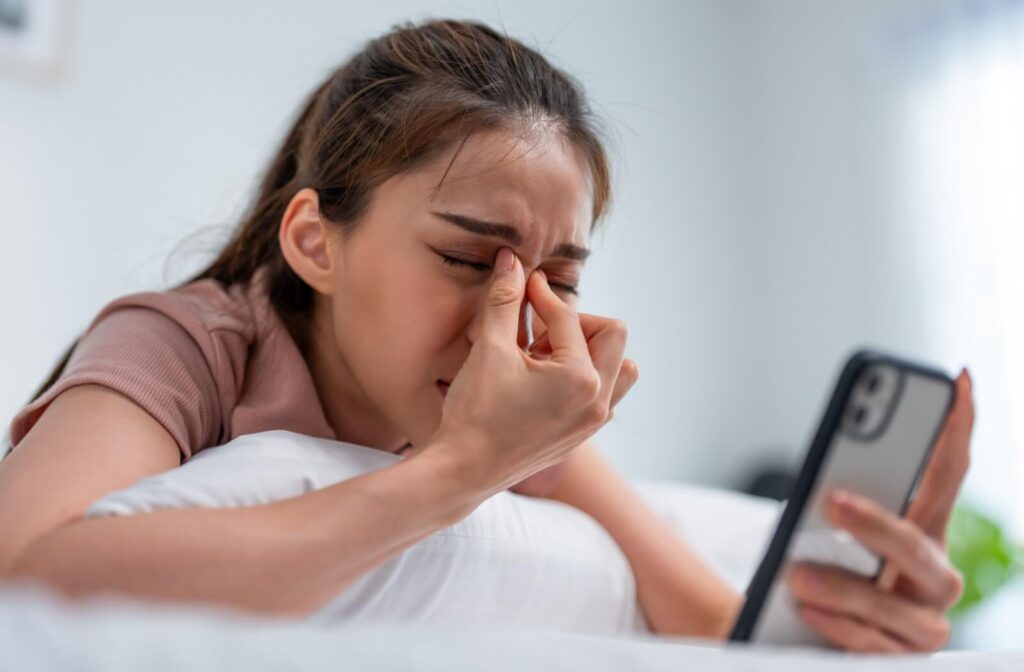Do you wake up with dry, itchy, or irritated eyes? You’re not alone. Morning dry eyes are a common complaint among adults. However, it can be challenging to pinpoint what is causing your eyes to feel gritty, red, or sore right when the day starts.
There are various reasons your eyes may be dry when you wake up, including a dry sleeping environment, allergies, dehydration, accidentally wearing contact lenses overnight, or even some medication side effects.
Some people also experience dry eye syndrome, which means their eyes don’t naturally produce the right amount of high-quality tears. Comprehensive eye exams can help uncover the root cause of dry eye symptoms and help restore comfort.
Dry Eyes vs. Dry Eye Syndrome
While “dry eyes” and “dry eye syndrome” are often used interchangeably, they refer to slightly different concepts.
Dry eyes can be a temporary symptom caused by external factors such as environmental conditions, seasonal allergies, or insufficient blinking during screen time. These instances of dryness usually improve with simple remedies, such as artificial tears or lifestyle adjustments.
On the other hand, dry eye disease is a more chronic and complex medical condition. It involves a persistent imbalance in the quantity or quality of tears, often due to conditions like meibomian gland dysfunction.
Unlike temporary dryness, dry eye syndrome usually requires targeted treatments, such as prescription eye drops, punctal plugs, or therapeutic devices.
Understanding this distinction is key to identifying whether your symptoms need straightforward changes or a more comprehensive management plan.
Common Causes of Morning Dry Eyes
Just like you, your eye health and comfort are one of a kind, and what might cause you discomfort can be equally unique.
However, morning dry eye often stems from a few common areas: your environment, sleep-related problems, existing health conditions, and aspects of your lifestyle.
Environmental Factors
Your surroundings play a significant role in the health of your eyes, especially while you sleep. Common environmental factors include:
- Low humidity or dry environments, such as one with air conditioning or heating, can rob your eyes of essential moisture
- Fans & vents that blow directly at your face can dry out the thin layer of tears that protect your eyes
- Airborne irritants, like dust, allergens, & pet dander, may cause irritation & inflammation overnight
Tip: Using a humidifier and checking that air vents don’t blow directly into your face can create a more eye-friendly environment.
Sleep-Related Issues
The quality of your sleep—or how you sleep—can directly affect how your eyes feel in the morning:
- Nocturnal lagophthalmos occurs when the eyes don’t fully close during sleep, exposing the eye’s surface to the air
- Poor sleep hygiene, including irregular sleep schedules or sleeping too few hours, can strain your eyes, leaving them feeling dry or tired upon waking
- Sleeping on your stomach with your face pressed against pillows may put pressure on your eyes & disrupt natural tear production
Keeping your eyes fully closed and maintaining good sleep habits are key to preventing morning dryness.
Health Conditions
Certain medical conditions can contribute to dry eyes in the morning, either directly or indirectly. Some health conditions that can lead to morning dryness include:
- Blepharitis, an inflammation of the eyelids, causing crusting & dryness
- Sleep apnea, as the airflow from CPAP machines can potentially reach your eyes
- Certain medications, such as antihistamines, decongestants, beta-blockers, & some antidepressants, can reduce natural tear production
If a health condition is contributing to your dry eyes, addressing it may greatly alleviate your symptoms.
Lifestyle Factors
Our daily habits often catch up with us, and eye health is no exception. Here’s how your lifestyle habits can impact your eyes overnight:
- Excessive screen time without regular breaks can strain your eyes, worsening dryness over time
- Sleeping with or wearing contact lenses for extended hours can dramatically exacerbate dryness
- Dehydration impacts your body’s overall moisture levels, including your tears
Adjusting lifestyle habits like screen breaks or staying hydrated can help reduce eye dryness and promote improved overall eye health.
At-Home Solutions for Morning Dry Eye

Although dry eyes can be irritating, there are many helpful remedies you can try in the comfort of your own home to ease your discomfort. These simple changes can significantly reduce how much your eyes bother you in the morning.
Apply Warm Compresses
A warm compress can stimulate the oil glands in your eyelids, improving tear quality. Place a warm washcloth over your eyes for 5–10 minutes to relieve discomfort.
Use Lubricating Eye Drops
Artificial tears or lubricating eye drops can quickly soothe dry eyes. Choose a preservative-free formula for frequent use to prevent irritation.
Practice the 20-20-20 Rule
Your eyes need rest after hard work, like any other muscle group. To prevent your eyes from becoming tired and strained during daytime screen use, look at something 20 feet away for at least 20 seconds every 20 minutes.
It’s a simple guideline to help refresh your eyes and reduce strain.
Stay Hydrated
Drinking enough water is vital for general health and maintaining a steady tear film that protects your eyes.
When to Seek Professional Care for Dry Eyes
Sometimes, at-home solutions aren’t enough to tackle chronic or severe morning dry eyes. Here’s when it’s time to see a professional:
- Persistent symptoms, including blurry vision & irritation, when dry eyes disrupt your daily life or worsen over time
- Sudden vision changes or discomfort as rapid or severe changes can indicate the need for emergency care
- Recurring infections with symptoms like inflammation, redness, or crusty discharge
- Ineffectiveness of over-the-counter remedies, including lubricating eye drops or other at-home treatments, indicating an underlying condition
Eye doctors may suggest prescription-strength artificial tears, punctal plugs to block tear drainage, or medicated eye drops to address inflammation.
Progressive therapies such as LipiFlow can also target the root cause of meibomian gland dysfunction (MGD), which often leads to dry eyes.
Early intervention can help prevent severe complications and maintain long-term eye health.
Find Effective Relief & Wake Up Comfortably
Morning dry eyes can be unpleasant, but you don’t need to settle for a daily struggle.
The Eye Care Team is proud to be one of the leading dry eye testing facilities in Eastern Washington. Contact us today to book an appointment. We can help you determine what’s causing your dry eye symptoms and find lasting relief.



